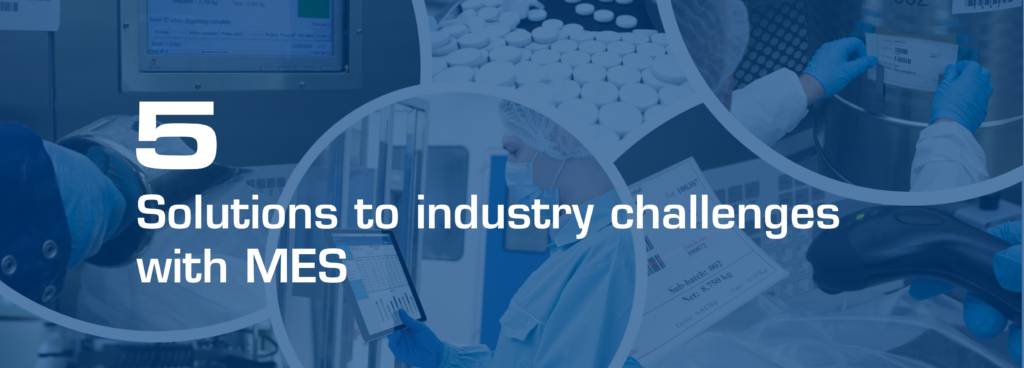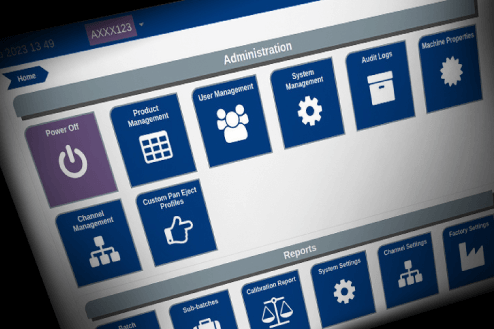 Back to news
Back to news
5 MES solutions to address industry challenges
Pharmaceutical manufacturers are operating in an increasingly competitive and fast-moving environment. Integrated continuous manufacturing, individualised medicine, counterfeiting protection and the focus on product quality are just some of the trends that are creating new pressures. The right MES solutions can address and overcome many of these complex challenges by providing real-time visibility, therefore enabling a better understanding of processes, faster resolution of issues, and improved decision-making.
1. Quality Challenges

With paper-based systems, companies can maintain high levels of quality; however, there is a high cost associated with ensuring this quality level. An MES reduces the cost of quality but also ensures there is no drop in quality level. MES provides enforced compliance in many aspects of manufacturing including enforced Standard Operating Procedures.
The chances of errors are minimised as manual operations are automated and all data entry is validated. And if there are any discrepancies, they are flagged up immediately and the process is halted, preventing the risk of production delay and batch failure.
2. Production Challenges

The more products handled in production or packaging, the less effective paper-based systems become. Not all batch records are completed “Right First Time”, which alongside batch failures and errors being identified too late, are all disadvantages of the paper-based production process. These issues can be eliminated with the right MES solutions.
Reviews of paper-based batch records can also be frustratingly slow. An Electronic Batch Record dramatically shortens the production release process — every step of the production process is verified automatically, saving time by working by exception as operators are alerted to omissions and exceptions.
3. Cost Challenges

From low-cost generics to high-margin, specialised drugs, everyone is working to make manufacturing more efficient, less costly, and reliably consistent.
With the introduction of an MES, some of the largest cost savings can be made by focusing on streamlining manual processes, reducing staff costs, minimising the risk of scrapped production and disposal costs, and providing significant scope to reduce inventory levels through real-time stock movements and updates.
4. Compliance Challenges

Inspectors policing large pharma markets are looking in detail at the underlying recordings, systems and handling of data. Data integrity is receiving the highest levels of attention in industry due to the risks of failing to meet the latest regulatory expectations regarding counterfeiting, tampering, and traceability. MES directly lowers the risks of data integrity issues and audit failure and therefore has a huge impact on compliance records.
5. Data Analysis Challenges

The amount of paper-based data collected in a pharmaceutical manufacturing operation is staggering, yet research shows that much of this information is rarely used for anything more than compliance. Data access with paper systems is at best problematic for assessing current product status or analysing historic batch results. Manufacturers can use MES technologies and the information they provide to understand and improve their processes.
With MES solutions, you gain real-time visibility on operations and processes. Real-time information from the manufacturing process is needed to prevent problems, drive quality, and enable the flexibility your customers require. MES enables this reach into the manufacturing process and is seen as a key requirement for successful Business Process Management.
MES Solutions can Help Address Your Industry Challenges
MES solutions don’t just help you implement manufacturing operations — a superior solution can even help you tackle industry challenges and lead you to outperform competitors. In this article, we summarised some of the key industrial challenges that an MES can help address:
- Quality Challenges – minimise the cost of quality
- Production Challenges – ensure it is “Right First Time”
- Cost Challenges – make better use of your resources
- Compliance Challenges – lower the risk of data integrity issues
- Data Analysis Challenges – gain real-time visibility on operations
We hope our article was helpful in highlighting how picking the right MES technology can help manage these pressures from industry. If you would like to learn more about our MES solution or discuss an MES implementation project, please contact our specialist team here.






